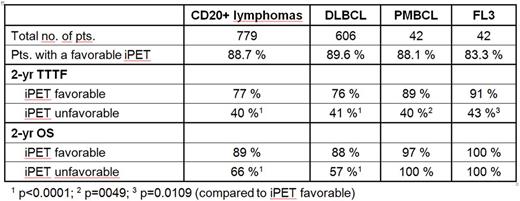Abstract
Introduction: The PETAL trial is a multicenter randomized controlled study for patients with aggressive lymphomas of diverse histologies (EudraCT 2006-001641-33, NCT00554164). In the study population as a whole interim PET (iPET) reliably predicted time to treatment failure (TTTF) and overall survival (OS). Interim PET-based treatment changes, however, had no impact on outcome (ASH 2014, abstract 391). Here we report the exploratory analysis for aggressive B cell lymphomas.
Methods: Pts. aged 18 to 80 yrs. with newly diagnosed aggressive lymphomas and a positive baseline PET received 2 cycles of rituximab (R), cyclophosphamide, doxorubicin, vincristine and prednisone (CHOP) followed by iPET. The conditions of iPET were strictly defined: 3-week interval between the 2nd R-CHOP cycle and iPET to avoid inflammatory reactions (Eur J Nucl Med Mol Imaging 30:682, 2003), no G-CSF after the 2nd cycle to avoid altered glucose biodistribution (J Nucl Med 47:950, 2006), standardized uptake value (SUV)-based PET interpretation to improve reproducibility (favorable iPET response: reduction of maximum SUV by > 66 % compared to baseline; J Nucl Med 48:1626, 2007). Pts. with CD20+ lymphomas and a favorable iPET were randomized to receive 4 more cycles of R-CHOP or the same treatment plus 2 extra doses of R (part A of the trial). Pts. with an unfavorable iPET were randomized to continue R-CHOP for 6 additional cycles or receive 6 blocks of a more complex methotrexate-, cytarabine- and etoposide-based regimen originally designed for Burkitt lymphoma (Blood 124: 3870, 2014; part B). R was omitted in pts. with CD20- lymphomas. Sample size of the entire study population was based on the empirically derived assumption that treatment failure after 2 yrs. (TF: progression, relapse, treatment discontinuation due to toxicity, start of alternative therapy, death of any cause) could be improved from 80 % to 90 % in part A and from 30 % to 45 % in part B (alpha=0.05, power=0.8). Secondary endpoints included OS and toxicity.
Results: Fifty-seven oncological centers and 23 nuclear medicine institutions participated in the trial. Between 2007 and 2012 1072 pts. were registered, and 862 (80.4 %) had a positive baseline PET, received 2 cycles R-CHOP, underwent iPET and were allocated to one of the post-iPET treatment arms detailed above. Reference pathology was available in 98 %, and median follow-up is 52 months. All in all, there were 779 patients with CD20+ aggressive B-cell lymphomas (90.4 % of all treated pts.) of whom 606 had diffuse large B-cell lymphoma (DLBCL), 42 primary mediastinal B-cell lymphoma (PMBCL) and 42 follicular lymphoma grade 3 (FL3). Interim PET was favorable in 691 pts. (88.7 %) and unfavorable in 88 pts. with CD20+ lymphomas (11.3 %). It was highly predictive of TTTF for CD20+ lymphomas in general and for each of the DLBCL, PMBCL and FL3 subgroups (Table). In CD20+ lymphomas and DLBCL, the iPET response predicted TF independently of the International Prognostic Index, and it was also predictive of OS. The groups of PMBCL and FL3 were too small for multivariate analyses.
In part A, adding 2 extra doses of R failed to improve TTTF and OS in all histological entities. Separate analyses for subgroups defined by sex, age (< vs. > 60 yrs.) or a combination of the two showed no statistically significant benefit of extra doses of R in any of the subgroups. In pts. with an unfavorable iPET response, a switch from R-CHOP to the Burkitt regimen failed to improve TTTF or OS in CD20+ lymphomas in general (Figure) and in the DLBCL, PMBCL and FL3 subgroups. In part B, the Burkitt protocol was associated with more grade 3/4 leukopenia (82 % vs. 57 %, p=0.02), thrombocytopenia (59 % vs. 18 %, p=0.0001), infection (41 % vs. 16 %, p=0.017) and mucositis (39 % vs. 7 %, p=0.0007) than R-CHOP, but treatment-related mortality was similar in both arms (1 death each).
Conclusion: In this large multicenter trial iPET proved highly predictive of outcome in pts. with CD20+ aggressive B-cell lymphomas, DLBCL, PMBCL or FL3 treated with R-CHOP. In pts. with a favorable iPET response, addition of 2 extra doses of R to 6 cycles R-CHOP failed to improve outcome in CD20+ lymphomas in general and in subgroups defined by histology, sex or age. In pts. with an unfavorable iPET response, switching to a more aggressive protocol also failed to improve outcome in any of the entities. Novel strategies are required for aggressive B-cell lymphomas failing to respond to the first 2 cycles of R-CHOP.
Duehrsen:Roche: Honoraria, Research Funding; Amgen: Honoraria, Research Funding; Alexion Pharmaceuticals: Honoraria, Research Funding. Giagounidis:Celgene Corporation: Consultancy. Grube:BMS, Sanofi: Consultancy. Klapper:Roche, Novartis, Amgen, Takeda: Research Funding. Hüttmann:Bristol-Myers Squibb, Takeda, Celgene, Roche: Honoraria; Gilead, Amgen: Other: Travel cost.
Author notes
Asterisk with author names denotes non-ASH members.



This feature is available to Subscribers Only
Sign In or Create an Account Close Modal